The ‘Bugger All’ B.A. Fallacy: The Importance Of Keeping The Arts In Academia
A student perspective on the cuts threatening the creative programmes at Victoria University of Wellington - and why the fight for survival is so crucial.

We've heard from faculty and academics - but those who have experienced the benefit of tertiary arts education are also speaking out about the impending cuts facing the sector.
James Ladanyi completed a Bachelor of Arts undergraduate at Victoria University of Wellington from 2014 - 2016, before moving to the U.K. in 2018 to study a Masters in Professional Acting at the prestigious Bristol Old Vic Theatre School. That same year, Ladanyi was awarded the Dame Malvina Major Foundation's Arts Excellence Award for the Wellington Region. After returning to Wellington during the pandemic in 2020, he's been working as a freelance creative.
At some point, somewhere along the line, someone said:
“Art is not an academic process.”
And at some point, somewhere further along the line, this was contorted into an entirely different idea:
“academia does not functionally assist arts careers.”
Let’s unpack, shall we?
No magic formula
To some extent, I can get actually on board with the first statement.
As a 28-year-old actor, producer, podcaster, writer, and creative Jack of all trades - patching together a career in the arts industry while barrelling towards my thirties - I’ve spent much of the last few years learning to let go of the idea that there’s a ‘formula’ for becoming a successful artist.
Because there isn’t.
Being an artist is fundamentally unpredictable. Your career doesn’t operate on a simple ‘education + years of experience = prosperity’ model.
It’s not linear. It’s not systematic. And how do you even define success in a field where luck is often a more powerful force than talent?
Coming to terms with the volatile, erratic, and whimsical nature of working in the arts is crucial if you want to stick it out in the industry for the long haul. And in that sense, one could make the case that being an artist, living as an artist, and working as an artist, doesn’t really fit the academic mould.
But there’s an important distinction to make.
Recognising the unpredictable nature of a career in the arts does NOT equate to believing that arts and humanities don’t belong in universities.
It is NOT the same as the idea being floated around that academia and academic institutions have limited or no role to play in developing artists, and their art.
Accepting that the world of the professional artist is a weird and wonderful timeline, where degrees don’t guarantee work, and grades don’t particularly evaluate industry capability, does NOT justify the shortsightedness at the heart of Victoria University’s proposed cuts to arts and humanities programmes.
The tangible problem on the table may well be a north-of-$30 million financial deficit faced by the institution, but the real underlying issue that needs to be addressed is a deep-rooted devaluation of the arts and humanities in Aotearoa New Zealand.
Arts inspiration
I was born and raised in Wellington.
In 2003, I was in Year 3 of primary school. I remember my parents pulling me out of class one afternoon so that I could witness the world premiere red carpet for The Lord of the Rings: The Return of the King in town (below).

I remember standing on Courteney Place, throwing crepe paper ribbons in the air, with 250,000 other people lining the streets and experiencing what was (at the time) the largest film premiere ever held.
The Largest.
Film Premiere.
Ever Held.
Anywhere.
In The World.
On that day, there was no question that we valued, cherished, and celebrated the arts in this country.
In 2010, I was in Year 10 of secondary school. I remember going through the process of choosing NCEA Level 1 subjects for the following year. I can also remember questioning the advice of most teachers, who all strongly suggested that all students should continue taking a science subject in Year 11, in order “to keep university options open.”
Why? I asked myself.
I was never going to pursue a scientific career. I didn’t particularly enjoy those subjects. They didn’t stimulate me. I wasn’t particularly good at them, either. So why continue with them? Why not allow myself to add additional arts and humanities subjects to my timetable? Subjects that did stimulate me. Subjects I was actually good at.
Physics, Chemistry, and Biology were out. History, Classics, Drama, and Music were in.
In Year 12, that same school introduced the International Baccalaureate (I.B for short) education programme as an alternative to NCEA. I remember a senior staff member holding a seminar to explain how the I.B programme worked, and the amazing benefits and opportunities that would come as a result of choosing to study within the new system.
I remember asking that senior staff member why it was possible for an I.B student to study three STEM subjects- at the expense of taking any arts or humanities component - but it was not allowed for a student to take two arts subjects, if it meant dropping a science or maths. Unsurprisingly, my question was not met with a particularly convincing answer.
Because the implicit messaging then was the same as it is now:
that arts and humanities programmes are the least valuable, and most disposable, within our education systems.
It is this shortsighted, deeply flawed perspective on education that is at the heart of the proposed cuts at Te Herenga Waka: Victoria University of Wellington (VUM).
What happened to our love for the arts? What happened to rolling out the red carpet for creativity?
Forging a path
By the end of Year 13, I was pretty convinced that I wanted to become a professional actor. However, at the age of eighteen, I was also something of a realist.
I knew that acting would be a difficult, stressful, highly competitive career, and so rather than auditioning for Toi Whakaari, New Zealand Drama School, I chose to enrol in a Bachelor of Arts at Victoria University, majoring in Theatre and History.
I did that because, more than anything, I wanted to test my determination to pursue a career in the arts world.
I wanted to find out whether my drive to act would endure over three years at university.
I wanted to test out a range of subjects across the arts and humanities programmes- Theatre, Film, English, History, Media, and Philosophy.
I wanted to experience the trials and tribulations of a classic undergraduate arts degree.
I wanted to come out the other side of my B.A, and find that I was still inspired and motivated to chase my performing artist dreams.
So I did - and I was.
When I remember my three years at VUW, I look beyond the specifics of the papers I studied - beyond the history essays, the debates in tutorial rooms, and even the many late-night theatre rehearsals. Instead, I reflect on how important it was to learn how to manage my own time.
I think about the process of forming connections and relationships with complete strangers.
I think about having to interact with people who I didn’t necessarily see eye-to-eye with.
I think about discovering - in each and every one of these daily Bachelor of Art experiences - what was important to me.
Because I think, when you boil it all down, what really matters in a university journey - what every single tertiary student is given the opportunity to experience - is learning how to learn and finding out what you’re really passionate about.
These two things are what I am most thankful to the arts and humanities programmes at VUW for. Those lecturers, course coordinators, tutors, and classmates all combined to help me clarify what I wanted to do with the next stage of my life.

And I know that I’m not alone in this. There are thousands of other New Zealanders who share these sentiments.
Crunch time in the capital
When I decided to stay in Wellington for university, I remember doing so because I felt there was something special about the city’s arts and culture environment.
I still feel that way but the environment is - without a doubt - crumbling. In the wake of the pandemic, Wellington’s artistic communities are something akin to a wobbling, unstable Jenga tower.
And Victoria University’s proposed cuts to Theatre, Music, Design, Classics, Teaching, English, History, Library Studies, Museum and Heritage Studies, Classical and Jazz Performance, and many other programmes, is a trembling hand, reaching towards that tower - poised to pull out the block that needs to stay exactly where it is to keep the tower upstanding.
To keep the community alive.
Because if these cuts go through, the cultural fabric of Aotearoa will shift again - for the worse. For everyone.
Just leaving the f*cking Jenga tower alone.
The arts belong in academia.
To all the Victoria University arts and humanities staff that played a part in my individual journey, thank you. To Kerryn Palmer and the Theatre department, you are mighty.
Act on.
